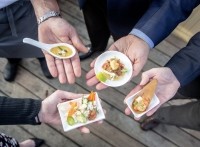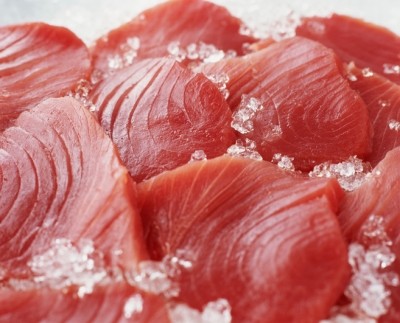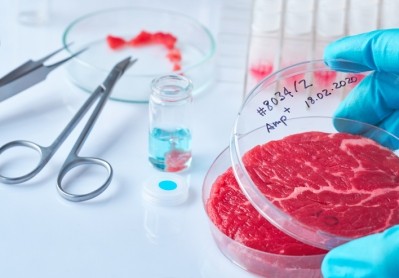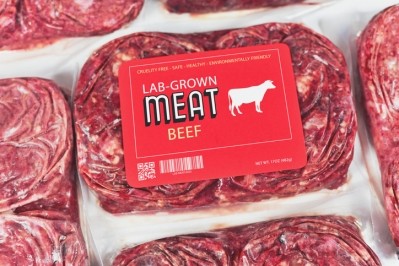Nutreco partners with cell-based seafood startup

We spoke to Nutreco CEO, Rob Koremans, to hear more about the company’s rationale for supporting cultured meat and seafood innovators, and longer-term goals for the business.
“We don’t expect that people will all of a sudden stop consuming animal proteins though milk, meat and eggs, but we do see both BlueNalu and Mosa Meat as solutions that can help to provide additional sources of animal proteins.”
“If we are serious about feeding the future in a sustainable way, we will need to produce protein from a variety of sources, including animal agriculture as well as alternative proteins.”
While the partnerships are focused on exploratory collaboration, there is an opportunity for Nutreco to supply ingredients for the culture media used by both startups but such a revenue stream would only be an add-on to the Dutch group’s traditional agriculture and aquaculture focused business model, he said.
“Cultured meat is not going to replace red meat. In essence, we see that cell-based meat and seafood add to the options available for consumers.

“If we just continue producing animal proteins as we do today, that is not going to be sufficient to feed a global population of 10 billion people in the future,” said the Nutreco lead.
BlueNalu says it is specifically focused on seafood species that are over-fished, primarily imported, or difficult to farm-raise such as tuna. Cellular aquaculture involves the isolation of living cells from fish tissue, with those cells subsequently placed into culture media for proliferation, and then assembled into fresh and frozen seafood products.
“BlueNalu has already demonstrated it can do that with yellowtail, which is real progress, an important milestone. Given the technology, the expertise, and the management team involved and also the fact the company produces in a way that is completely non-GMO and does not require the use of Fetal Bovine Serum (FBS) [to grow the cells], the BlueNalu process is a very sustainable way to produce fish,” said Koremans.
Cultured red meat and seafood production could also be done close to large urban settings, he added. “It means you don’t need to ship animals [or animal products] all over the world. You can produce to requirements, and you don’t need to kill any animals. So, for anyone that has animal welfare concerns, this is an [ideal] way of producing animal proteins. But it is still experimental.”
On the innovation path
The partnerships with BlueNalu and Mosa Meat were made through Nutreco’s strategic innovation and investment team, NuFrontiers. “We created a small team of people able to judge new technologies, a team with contacts and networks, and we started to reach out through this venture group, which has €20m available for investments. Through that, we have scanned well over 100 companies and initiatives, and we continue to do so. In general, we are looking at alternative proteins but also improved farming practices,” said Koremans.
As part of that process, Nutreco, in 2018, took a 25% share in Eruvaka, an India-based Internet of Things (IoT) company that develops connected devices and mobile-based decision tools aimed at helping shrimp farmers increase productivity, he said. “It has dramatically improved the survival rates and quality of shrimp.”
Digital systems to improve farming are vital, he believes.
Beyond Eruvaka, its Skretting 360+ system, relying on data, monitors shrimp ponds, quality of water, oxygenation, feeding and the entire farming practice. “Farmers that have worked with us on this have tripled their production.”
Another aquaculture related concept, Aquantum Leap, operated by Seafarming Systems, that Nutreco’s venture arm was backing has hit some hurdles locally. That is a closed containment farming system aimed at promoting cost effective salmon production that also overcomes biological and environmental challenges in the Norwegian fjords.
“There are some technical barriers around that, and we will continue to look at that. If you look at the west coast of Canada, for example, where there are huge concerns about open-pen salmon farming, closed containment farming could really be an alternative. We are also looking at land-based farming. There are many restrictions on salmon production today and growing that sector has its limitations, we need to look at potential solutions,” said Koremans.
Feed protein
In terms of innovation in the area of nutrition, Skretting, Nutreco’s fish feed arm, has long been looking at alternatives to fishmeal and soy and has made great strides in that regard, producing all vegetable diets for salmon, supporting innovation around algae, and insect-based proteins, he said. “We are going beyond that, we have identified an opportunity to produce microbial proteins but we are not yet in a position to disclose much more around that at this stage.”
And Nutreco’s R&D team remains committed to improving the way that milk and meat is produced through cattle production or eggs via the laying hen production sector, he stressed. “Sustainable animal agriculture and aquaculture is here to stay as the demand for high quality animal protein will continue to grow. There is still a lot to be gained there.”
The industry is only using around 60% of the genetic potential of farmed animals, he commented. “If we can produce more proteins with the same amount of animals or the same amount of proteins with fewer animals, we could make a really big impact. We remain fully committed to providing farmers with digitally-enabled and farm-focused solutions to support them in raising their animals in an effective and sustainable manner."
Developing alternatives to antibiotics and reducing the risk of antimicrobial resistance is mission critical for Nutreco’s animal production arm, Trouw Nutrition, he added. “That is something we take very seriously.”
Strategic focus
Nutreco, as far back as 2011, was making noise about its goal of focusing primarily on premix, feed specialties and fish feed. And in line with that revised approach, it sold its compound feed activities in the Benelux in 2012. But then, in 2014, the divestment of its Iberian compound feed business was halted and Nutreco has since bolstered those operations, acquiring Cargill’s feed assets in Portugal last year. Rumors were also rife in May last year that the Dutch group was in talks to buy the animal feed assets of Korea’s CJ CheilJedang Corp.
Has Nutreco’s view on the compound feed business shifted? Koremans weighed in on that:
“We believe that, in Iberia, with our Nanta compound feed business, we have an extremely strong position, and having an integrated approach in Iberia really helps us. The same is true in Canada, and parts of North America, where, through our Hi-Pro Feed business, we have a good market share, and we have the scale to do compound feed.
“As opposed to a few years back, when we believed that moving out of compound feed would be a wise move, I think we are now a bit more differentiated in our thinking on that. We believe that our strategy in Asia should be different from our strategy in the Benelux, for instance.
“Expanding in Asia is important for us strategically. We are looking for opportunities to build our own business there, it will always be a mix of organic growth and through acquisitions. In Asia, the companies that do well are the ones that have an integrated business and are involved in both farming and complete feed.”














